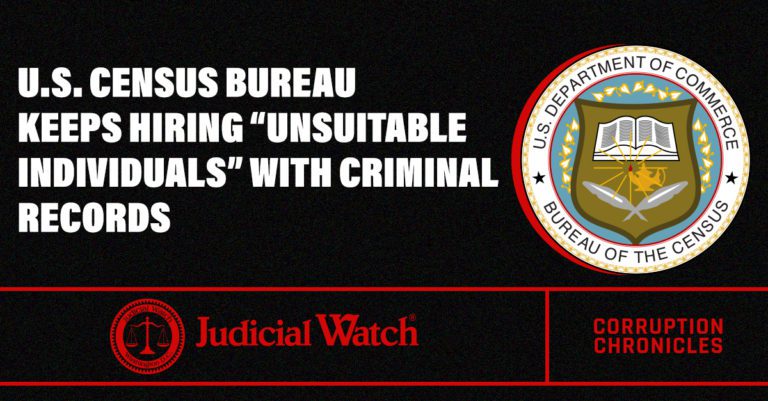

U.S. Census Bureau Keeps Hiring “Unsuitable Individuals” with Criminal Records


Thirteen years after a federal investigation blasted the U.S. Census Bureau for hiring criminals to enter American homes to gather statistics for the decennial count, a new audit reveals the disturbing practice continues. In fact, more than a decade after the problem was exposed workers for the 2020 count were not properly vetted and many with criminal records had direct interactions with the public. The most recent probe, conducted by the Department of Commerce Inspector General, found that “dozens of employees who worked on address canvassing in advance of the 2020 census had major issues flagged on their investigations, which typically means employees are automatically disqualified from their federal jobs.”
Chunks of the 28-page report are redacted but the gist is well conveyed, that the Census Bureau has long failed to screen its workforce and therefore endangers the public. It’s not like there isn’t a vetting system in place. When one of the 248 regional offices recruit a candidate, the Census Investigative Services (CIS) at the agency’s headquarters in Suitland, Maryland is charged with conducting a pre-employment suitability review. The process includes sending fingerprints to the Federal Bureau of Investigation (FBI) and a credit history as well as self-disclosed criminal record to CIS for review. Nevertheless, the Bureau still hires felons—including sex offenders—at regional offices nationwide. As an example, a few years ago the Charlotte, North Carolina Area Census Office (ACO) employed a man convicted of a felony involving sex with a child as a regional recruiting manager because despite his criminal record, he passed the Census Bureau’s background check.
The Bureau’s negligent security practices have been on the radar of federal lawmakers for years. Over a decade ago, Congressional investigators slammed the agency for failing to adequately conduct mandatory background checks for tens of thousands of workers, resulting in the hiring of hundreds of violent criminals. At the time, the probe found that more than 35,000 temporary census workers were employed without the proper criminal background check, which includes fingerprinting. That means that more than one-fifth of the canvassing workforce did not get properly processed or fully screened for employment eligibility, creating an obvious security risk. More than 200 of those were subsequently determined to have criminal records yet were in constant contact with the public while canvassing for the 2010 census. Investigators said the criminal record checks were bungled because the Census Bureau’s incompetent staff was poorly trained to conduct them.
Twelve years ago Judicial Watch reported that the Census Bureau knowingly hired a registered sex offender with a long criminal history to make home visits even though such convicts are banned from working for the agency. The embarrassing gaffe came to light when a young mother in a New Jersey suburb recognized the census worker who came to her home from the state’s registered sex offender database. She initially thought it was safe to provide the man with information because he was a legitimate government worker with a badge and bag sporting the U.S. Census Bureau’s official logo. Incredibly, the sex offender used a fake name to get the census job but failed a fingerprint check after getting hired. The agency still let him to complete four days of training and allowed him to visit homes even though he did not pass the background check.
The latest audit, released last week, shows that virtually nothing has changed after all these years and that the Bureau has done little to improve its derelict hiring practices. Investigators found that at least 6,802 census workers were not properly adjudicated, “resulting in persons with significant issues working for the Bureau and, in some instances, contacting households during the 2020 Census NRFU [Nonresponse Followup] operation.” In cases when CIS adjudicators actually vetted employees, the watchdog found that they often failed to request necessary documentation to assess the severity of the issues raised. Stressing that background checks are a critical process to help protect the nation’s interests by establishing trust in the federal workforce, the IG points out the obvious in its recent report: “The lack of oversight increases the risk of unknowingly allowing unsuitable individuals into positions of public trust, which could cause harm to the bureau.”















